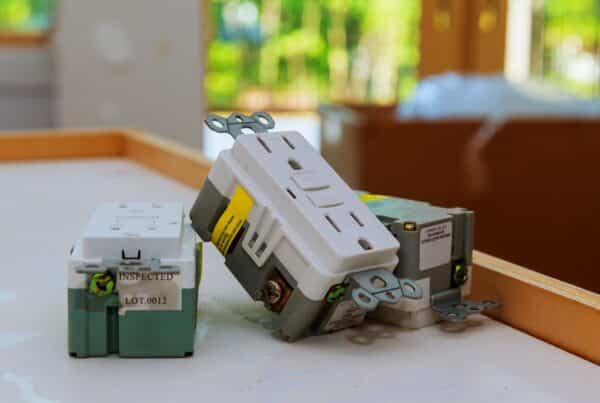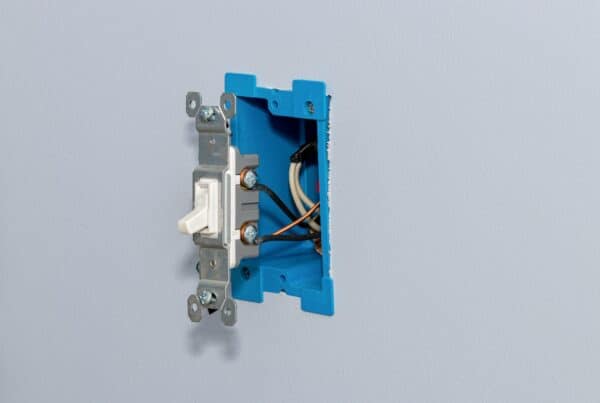
Electrical accidents in the kitchen can happen in an instant. Consequently, kitchen safety measures like GFCI protection are critical. GFCI, or ground fault circuit interrupter, is an essential electrical safety device found in kitchen outlets. But do garbage disposals need GFCI protection too?
In this post, we’ll explore the details of GFCI and how it relates to the specific requirements for garbage disposals. We’ll also go over practical tips for adding GFCI outlets yourself and when it’s necessary to consult an expert.
What Is GFCI?
GFCI (ground fault circuit interrupter) is an electrical safety device typically found in the kitchen, bathroom, laundry room, and outdoor outlets. GFCIs monitor electricity flowing through a circuit and quickly cut off power when they detect a ground fault.
A ground fault occurs when electricity flows outside of the intended path, like through water or a person. This could happen if an appliance falls into a sink or if you touch a faulty wire. Without GFCI protection, this could result in a serious or fatal electric shock.
The key mechanism within a GFCI outlet is an internal circuit board. This board has a transformer that detects small differences in electricity flowing out versus returning to the outlet. If there’s an imbalance of as little as 4-6 milliamps, the GFCI will automatically trigger the internal switch to stop the flow of power within as little as 1/40th of a second. This rapid response prevents electrocution.
For residential kitchens, the National Electrical Code requires GFCI protection for all receptacles within 6 feet of a sink. Additionally, GFCIs are recommended for areas prone to wetness like near dishwashers. But what about garbage disposals, which present electrical and water risks? We’ll cover the specifics around disposal GFCI requirements next.

Garbage Disposals and GFCI: The Current Code Explained
When it comes to the National Electrical Code (NEC), garbage disposals have specific requirements regarding GFCI protection.
According to NEC, hardwired garbage disposals themselves do not require GFCI protection. However, the receptacle providing power to the disposal must have GFCI protection.
Additionally, if the receptacle is within 6 feet of a sink, which is often the case, then the NEC requires it to be GFCI protected regardless of the disposal.
The reasoning comes down to safety. While the disposal motor is grounded and hardwired directly, the power outlet can still pose a risk of electrocution. The plug and cord remain energized when operating the disposal. Water leaks are also common near disposals. The GFCI coverage provides an extra layer of shock protection in an inherently wet area.
While GFCI is not legally mandated directly on the appliance, adding GFCI outlets or breakers for disposals can prevent lethal mishaps. An imbalanced load could indicate a shock hazard before it potentially injures someone. This makes GFCI a practical safety enhancement for your garbage disposal.
Benefits of GFCI Protection for Disposals
Upgrading to GFCI-protected outlets is a simple way to boost the safety of your garbage disposal. Installing this electrical shield provides several unique benefits:
- Prevents Electric Shocks – GFCI outlets will quickly cut power at the first sign of a ground fault. This can prevent serious electrical shocks from a damaged disposal, cord, or outlet. GFCI protection provides an essential shield if you or water comes into contact with live electricity near the disposal.
- Detects Electrical Faults – GFCI outlets work by detecting tiny imbalances in the electric current. If your disposal has an internal electrical issue like damaged wiring, a GFCI can detect this and shut off power before a shock or fire hazard occurs. This early warning could prevent injuries and damage.
- Protects from Water Damage – It’s common for some water to splash near disposals despite shielding. Condensation can also accumulate under the sink over time. A GFCI outlet will immediately cut power if water causes a ground fault, protecting you and the disposal from further water damage.
- Isolates the Circuit – If your disposal causes a ground fault, the GFCI will isolate only the disposal’s circuit and outlets. This prevents outages to other essential nearby kitchen appliances like refrigerators or stoves. The localization also simplifies troubleshooting.
- No Need to Access Disposal – GFCIs work passively in the background by constantly monitoring electricity. No need to remove or directly alter disposable wiring. Simply replace an outlet or install a GFCI circuit breaker for added protection.

Regular Garbage Disposal Maintenance
Installing GFCI protection improves the electrical safety of your garbage disposal, but don’t forget about regular maintenance too. This keeps everything running smoothly and prevents problems down the road.
Make a habit of running cold water through the disposal before, during, and after use. Let the water flow for 30 seconds or so after turning off the disposal to flush things out completely. No one likes a clogged drain!
Additionally, toss some citrus peels or ice cubes with baking soda in there every so often. It freshens up the disposal and helps break down gunky buildup. Just don’t overdo it with the fruit and soda, which can be tough on the blades with regular use.
If you do run into a jam, unplug the disposal first! Use the handy wrench that came with it to carefully detach the obstruction. Alternatively, wooden tools like chopsticks or a spoon handle also work in a pinch.
A helpful proactive measure is to grab a flashlight and peek down the drain now and then to catch any clogs before they happen. Food scraps can fall there surprisingly easily, leading to various issues. Keep that pipe clear and your disposal will thank you!
Finally, replace the disposal grinding rings every 5 years or so. They dull over time and can’t grind as efficiently, which can lead to damage. A little proactive maintenance goes a long way.
When to Call a Professional
If you need GFCI protection installed or inspected, it’s best to contact a licensed electrician. They have the expertise to correctly handle electrical work safely and per local regulations. Similarly, if you continually experience jammed disposals that you cannot unclog yourself, a plumber can inspect for issues like broken blades or serious clogs in the drain line. A professional assessment can determine if the disposal needs any repairs.
Additionally, strange noises, burning smells, or other signs of malfunction are also a cue to call a pro. These could indicate electrical problems that an electrician can troubleshoot. Don’t take risks trying to fix complex disposal and GFCI issues solo. When in doubt, it’s usually safest to contact qualified professionals to get the job done right!
Conclusion
In summary, installing GFCI protection can significantly improve the safety of your garbage disposal – even though it’s not a National Electrical Code requirement. However, adding GFCI outlets or breakers to the disposal circuit provides crucial safeguards against shock and electrocution risks.
Also, don’t forget about regular maintenance! Proper cleaning, jam clearing, and part replacement keep everything running smoothly. If you decide GFCI coverage could benefit your disposal, contacting a trained expert is always your best bet. For an inspection of your plumbing, electrical, or the whole house, reach out to All Coast Home Inspections in Houston, TX, and surrounding areas.



